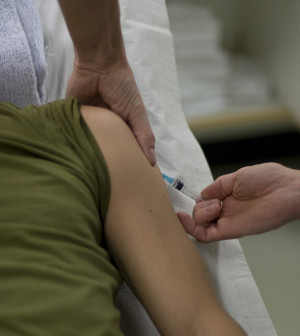- Could Your Grocery Store Meat Be Causing Recurring UTIs?
- Are You Making This Expensive Thermostat Error This Winter?
- Recognizing the Signs of Hypothyroidism
- 10 Strategies to Overcome Insomnia
- Could Artificial Sweeteners Be Aging the Brain Faster?
- Techniques for Soothing Your Nervous System
- Does the Water in Your House Smell Funny? Here’s Why
- Can a Daily Dose of Apple Cider Vinegar Actually Aid Weight Loss?
- 6 Health Beverages That Can Actually Spike Your Blood Sugar
- Treatment Options for Social Anxiety Disorder
Whooping Cough Vaccine Rates During Pregnancy Fall Short: CDC


To protect newborns from whooping cough, U.S. health officials advise all women to get vaccinated against the infection during pregnancy. But researchers report that too few do.
This Michigan-based study of women covered by Medicaid — the publicly funded insurance program for the poor — found only 14 percent got the shot while pregnant. Black, Asian and Arab women were less likely than whites to receive the vaccine, according to the report released Thursday by the U.S. Centers for Disease Control and Prevention.
Whooping cough, also called pertussis, is a highly contagious bacterial infection. Outbreaks in recent years led to a 2011 recommendation that women who hadn’t had the tetanus, diphtheria and acellular pertussis (Tdap) vaccine get it during pregnancy. In 2013, the guidelines were revised to include a Tdap dose in every pregnancy.
Infants, who are at highest risk for illness and death from whooping cough, gain passive immunity from maternal antibodies transferred to them in utero, the researchers explained.
“Ensuring that all infants receive the protection against pertussis afforded by maternal vaccination will require enhanced efforts, such as increased education of clinicians, parents and families,” Michelle Housey, of the Michigan Department of Community Health, and colleagues wrote in the report.
About half of babies under 1 year of age who get whooping cough end up in the hospital, according to the CDC.
For the study, published in the Sept. 26 issue of the Morbidity and Mortality Weekly Report, the researchers used statewide Michigan data on more than 15,000 mothers of babies born between November 2011 and February 2013. The mothers’ median age at the time of delivery was 21.
Among Arab women, the whooping cough vaccination rate was just under 7 percent — less than half of the rate for white women, at nearly 18 percent. Eight percent of black mothers-to-be, 12 percent of Asians and 15 percent of Hispanics got vaccinated, the researchers said.
“Vaccination was related to maternal age and gestational age at birth, but not to adequacy of prenatal care,” according to the report.
Younger women were less likely than older ones to get the shot. But “women whose care was rated ‘adequate’ or ‘adequate plus’ were not more likely to have been vaccinated than women whose care was rated ‘intermediate’ or ‘inadequate,'” the researchers said.
Privately insured women may be more likely to get vaccinated against whooping cough than those on Medicaid, however. A previous study found that more than 45 percent of privately insured women of child-bearing age (but not pregnant) got the vaccine during their lifetime, according to background information with the report.
More information
The U.S. Centers for Disease Control and Prevention has more about protecting your baby from whooping cough.
Source: HealthDay
Copyright © 2026 HealthDay. All rights reserved.










